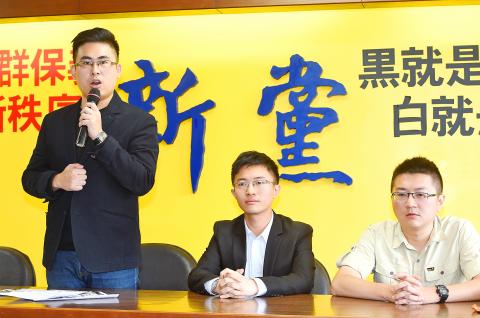New Party spokesman Wang Ping-chung (王炳忠), his father, and New Party youth wing executives Ho Han-ting (侯漢廷) and Lin Ming-cheng (林明正) were indicted yesterday after prosecutors said they found evidence of espionage and Chinese funding.
The three New Party defendants “had endangered national security and social stability by developing an organization for use by the Chinese government and its military” in contravention of the National Security Act (國家安全法), the Taipei District Prosecutors’ Office said.
Wang’s father, Wang Chin-pu (王進步), was charged with being an accessory to espionage and other illegal activities conducted by the other defendants.

Photo: Cheng Hung-ta, Taipei Times
Prosecutors said they uncovered evidence of money transfers from China to the three party members to work with convicted Chinese spy Zhou Hongxu (周泓旭) in his efforts to infiltrate Taiwan’s military and connect with Taiwanese politicians and youth organizations.
Zhou, a former graduate student at National Chengchi University, was Beijing’s liaison and was also responsible for monitoring progress and collecting reports made by Wang Ping-chung, Ho and Lin.
Zhou had set up a “Star Fire Secret Unit” and gave the four of them code names: Wang Ping-chung was “One,” Lin was “Two,” Ho was “Three” and Zhou was “Four,” the prosecution statement said.
Nine retired and active military officials were contacted to obtain classified materials, most of whom reportedly had links to the nation’s weapons procurement programs, prosecutors said.
Documents belonging to Wang Ping-chung showed that he was already working with Chinese officials in 2013, before meeting Zhou, and had later written that officials from China’s Taiwan Affairs Office had promised to provide him and Zhou up to NT$16 million (US$535,296 at the current exchange rate) a year for their work in Taiwan, they said.
Prosecutors said they had uncovered Wang Ping-chung’s accounting ledgers that showed money transfers from Chinese sources, in addition to a work document on which Wang Ping-chung wrote: “[I will] work under the guidance and assistance of the Chinese Communist Party to unite and integration the forces working to achieve unification across the Taiwan Strait.”
Wang Ping-chung allegedly cofounded the pro-unification Web site Fire News (燎原新聞網) with Zhou, which they used to recruit Taiwanese into their spy network.
The Taiwan High Court in April handed Zhou a 14-month prison sentence for attempting to recruit Taiwanese officials.
After the indictments were announced, Wang Ping-chung, Ho and Lin held a news conference in Taipei, at which Wang Ping-chung accused the prosecutors of “concocting a story” without any “smoking gun” evidence.
“If the judiciary has the guts, then I will ask for an open trial so that the public can see and judge for themselves,” he said.
Lin accused the administration of “adopting the ways of Adolf Hitler’s Nazi Party to crack down on dissidents.”

MAKING WAVES: China’s maritime militia could become a nontraditional threat in war, clogging up shipping lanes to prevent US or Japanese intervention, a report said About 1,900 Chinese ships flying flags of convenience and fishing vessels that participated in China’s military exercises around Taiwan last month and in January last year have been listed for monitoring, Coast Guard Administration (CGA) Deputy Director-General Hsieh Ching-chin (謝慶欽) said yesterday. Following amendments to the Commercial Port Act (商港法) and the Law of Ships (船舶法) last month, the CGA can designate possible berthing areas or deny ports of call for vessels suspected of loitering around areas where undersea cables can be accessed, Oceans Affairs Council Minister Kuan Bi-ling (管碧玲) said. The list of suspected ships, originally 300, had risen to about

DAREDEVIL: Honnold said it had always been a dream of his to climb Taipei 101, while a Netflix producer said the skyscraper was ‘a real icon of this country’ US climber Alex Honnold yesterday took on Taiwan’s tallest building, becoming the first person to scale Taipei 101 without a rope, harness or safety net. Hundreds of spectators gathered at the base of the 101-story skyscraper to watch Honnold, 40, embark on his daredevil feat, which was also broadcast live on Netflix. Dressed in a red T-shirt and yellow custom-made climbing shoes, Honnold swiftly moved up the southeast face of the glass and steel building. At one point, he stepped onto a platform midway up to wave down at fans and onlookers who were taking photos. People watching from inside

Japan’s strategic alliance with the US would collapse if Tokyo were to turn away from a conflict in Taiwan, Japanese Prime Minister Sanae Takaichi said yesterday, but distanced herself from previous comments that suggested a possible military response in such an event. Takaichi expressed her latest views on a nationally broadcast TV program late on Monday, where an opposition party leader criticized her for igniting tensions with China with the earlier remarks. Ties between Japan and China have sunk to the worst level in years after Takaichi said in November that a hypothetical Chinese attack on Taiwan could bring about a Japanese

The WHO ignored early COVID-19 warnings from Taiwan, US Deputy Secretary of Health and Human Services Jim O’Neill said on Friday, as part of justification for Washington withdrawing from the global health body. US Secretary of State Marco Rubio on Thursday said that the US was pulling out of the UN agency, as it failed to fulfill its responsibilities during the COVID-19 pandemic. The WHO “ignored early COVID warnings from Taiwan in 2019 by pretending Taiwan did not exist, O’Neill wrote on X on Friday, Taiwan time. “It ignored rigorous science and promoted lockdowns.” The US will “continue international coordination on infectious